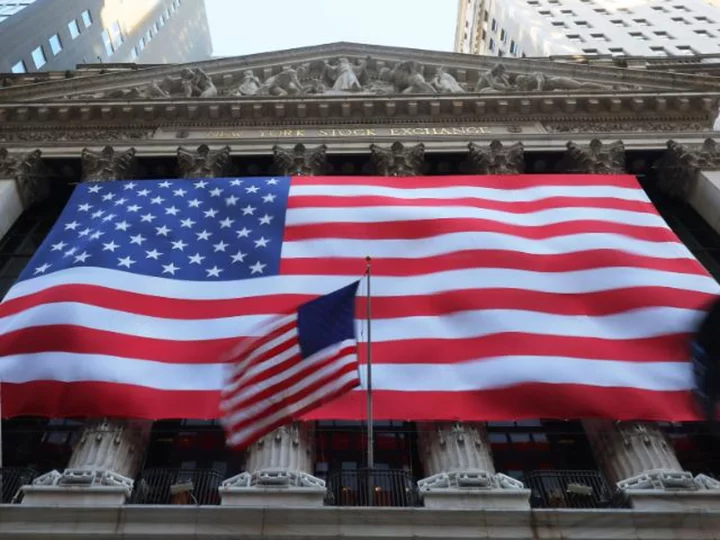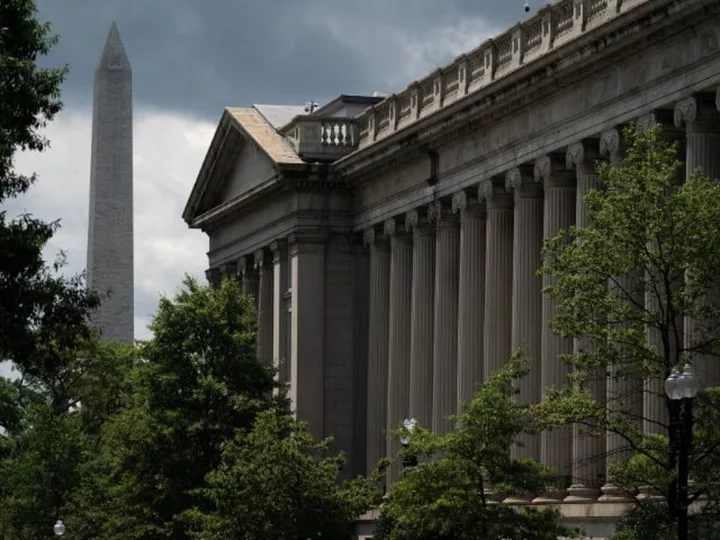The debt ceiling deal in Washington did not set off a celebration in the stock market. But the bipartisan compromise is causing fireworks for some companies that have emerged as winners.
Pipeline company Equitrans Midstream spiked around 40% on Tuesday because the agreement contains a surprising call to speed up the creation of a stalled natural gas pipeline called the Mountain Valley Pipeline.
Equitrans is the lead developer of the pipeline project, known as MVP, which has been championed by Democratic Sen. Joe Manchin.
Although the bill still needs to get through Congress and analysts warn the long-delayed project could still face hiccups, Wall Street isn't wasting any time betting on MVP by bidding up shares of Equitrans Midstream.
Still, environmental groups and some progressives are furious about the inclusion of the Mountain Valley Pipeline in the deal. The Sierra Club called on Congress to reject the deal and pass a clean bill to raise the debt ceiling.
End to student debt freeze?
Wall Street is also betting lending company SoFi will cash in from the debt ceiling deal because it calls for borrowers to start paying back federal student loans at the end of the summer. Shares of SoFi, a leader in the student loan refinancing space, jumped 5% Tuesday morning.
Isaac Boltansky, director of policy research at BTIG, said in a note to clients the deal "should be viewed as directionally positive" for SoFi as there may be "increased demand" for student loan refinancing.
However, Boltansky cautions that the Biden administration could still offer a repayment grace period and warned there may not be a "tidal wave" of refinancing activity in the student loan space due to high borrowing costs.
In March, SoFi launched a lawsuit against the Biden administration in a bid to end the pause on federal student loan payments that has been in place since March 2020.
IRS funding cuts, defense spending intact
Meanwhile, the debt ceiling deal would shift a total of $20 billion in IRS funding from fiscal 2024 and fiscal 2025 to be used in non-defense areas.
That loss of funding to the IRS is a "positive" for both H&R Block and TurboTax owner Intuit because it lowers the odds the IRS will build an expansive electronic tax filing system, according to BTIG's Boltansky. Earlier this month the IRS released a cost study about developing a free electronic tax filing system and launched a limited pilot program.
H&R Block gained more than 1% on Tuesday, while Intuit shares inched higher.
The defense industry is also emerging largely unscathed from the debt ceiling battle, unlike in 2011 when Washington agreed to significant defense spending cuts.
The fact that military spending is not getting axed is a win for defense contractors, which rely on the Pentagon for a large chunk of their revenue. Defense stocks including Lockheed Martin, Raytheon and Northrop Grumman were little changed on Tuesday.
'Unquestionably positive'
Big picture, the debt ceiling deal looks like a win for stock market investors because it removes the nightmare of a default (or a near-default) through January 2025 — without resorting to the kinds of spending cuts that would threaten the economy.
Goldman Sachs summed the deal up this way: "Major reduction in uncertainty, minor reduction in spending."
The Wall Street bank thinks the caps to spending will have only "very modest growth effects," reducing spending by just 0.1% to 0.2% of GDP in 2024 and 2025, compared with a baseline forecast in which funding grows with inflation.
Despite the spending caps, Goldman Sachs says inflation-adjusted discretionary spending is set to grow slightly next year because Congress already approved such a large spending hike for fiscal 2023.
"From a market perspective, this deal should be viewed as unquestionably positive," BTIG's Boltansky wrote. "It remains deeply disheartening that it took months of posturing and an impending catastrophic deadline to produce a decidedly modest piece of legislation, but Washington is poised to avoid economic calamity and for that we should be thankful."









